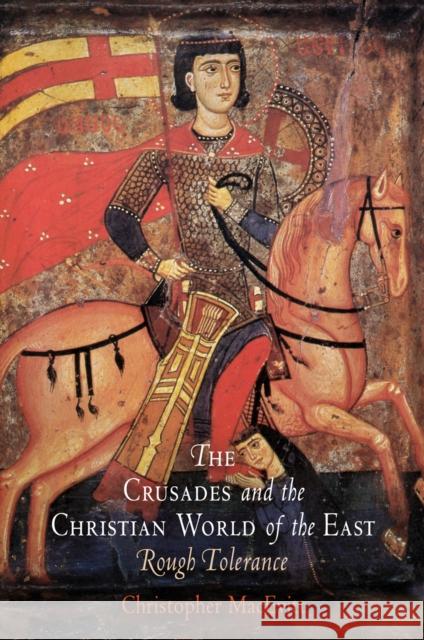The Crusades and the Christian World of the East: Rough Tolerance » książka
The Crusades and the Christian World of the East: Rough Tolerance
ISBN-13: 9780812240504 / Angielski / Twarda / 2008 / 280 str.
The Crusades and the Christian World of the East: Rough Tolerance
ISBN-13: 9780812240504 / Angielski / Twarda / 2008 / 280 str.
(netto: 306,28 VAT: 5%)
Najniższa cena z 30 dni: 320,97 zł
ok. 22 dni roboczych.
Darmowa dostawa!
The Crusades and the Christian World of the East Rough Tolerance Christopher MacEvitt "A first-rate piece of scholarship that will have a major impact on the field of crusade studies and medieval history in general. . . . A must for all historians of the Latin East and those interested in relations between the churches."--Jonathan Riley-Smith, author of The First Crusade and the Idea of Crusading "A superb contribution to understanding the complex interaction of local and occupying Christian populations during the crusading era. . . . Highly recommended."--Choice "An important book, which shows that the Western settlers did not remain a foreign presence but became fully integrated in the society of the Levant."--TLS In the wake of Jerusalem's fall in 1099, the crusading armies of western Christians known as the Franks found themselves governing not only Muslims and Jews but also local Christians, whose culture and traditions were a world apart from their own. The crusader-occupied swaths of Syria and Palestine were home to many separate Christian communities: Greek and Syrian Orthodox, Armenians, and other sects with sharp doctrinal differences. How did these disparate groups live together under Frankish rule? In The Crusades and the Christian World of the East, Christopher MacEvitt marshals an impressive array of literary, legal, artistic, and archeological evidence to demonstrate how crusader ideology and religious difference gave rise to a mode of coexistence he calls "rough tolerance." The twelfth-century Frankish rulers of the Levant and their Christian subjects were separated by language, religious practices, and beliefs. Yet western Christians showed little interest in such differences. Franks intermarried with local Christians and shared shrines and churches, but they did not hesitate to use military force against Christian communities. Rough tolerance was unlike other medieval modes of dealing with religious difference, and MacEvitt illuminates the factors that led to this striking divergence. "It is commonplace to discuss the diversity of the Middle East in terms of Muslims, Jews, and Christians," MacEvitt writes, "yet even this simplifies its religious complexity." While most crusade history has focused on Christian-Muslim encounters, MacEvitt offers an often surprising account by examining the intersection of the Middle Eastern and Frankish Christian worlds during the century of the First Crusade. Christopher MacEvitt teaches religion at Dartmouth College. The Middle Ages Series 2007 280 pages 6 x 9 3 illus. ISBN 978-0-8122-4050-4 Cloth $49.95s 32.50 ISBN 978-0-8122-2083-4 Paper $22.50s 15.00 World Rights History, Religion Short copy: In The Crusades and the Christian World of the East, Christopher MacEvitt marshals an impressive array of literary, legal, artistic, and archeological evidence to demonstrate how crusader ideology and religious difference gave rise to a mode of coexistence he calls "rough tolerance."











